 |
 |
 |
 |
 |
 |
 |
 |
 |
First Division - Hillsborough, Sheffield - 18,623
Scorers: Charlton, Lorimer, Giles pen, Madeley, Yorath
Leeds United: Sprake, Reaney, Cooper, Bremner, Charlton, Hunter, Lorimer, Clarke, Belfitt (Yorath), Giles, Madeley
Newcastle United: McFaul, Craig, Clark, Gibb, McNamee, Moncur, Cassidy, Tudor, Macdonald, Guthrie, Hibbitt
The figures took into account all the various teams operated
by a club - from first-team to youth side, as Revie was at pains to point
out. 'We did not have a single first team player sent off last season
and we had only one suspended, Billy Bremner, after a series of cautions,
which is a lot more than many clubs can say. The majority of our offences
were committed by junior second team players or boys.' The FA were presented with another opportunity to make an
example of United in 1971 following the club's
controversial game against West Bromwich Albion on 17 April. At the time, United were locked in a race for the
title with Arsenal and badly needed the points to bolster their
challenge. After falling a goal behind, they were pressing furiously
for a second half equaliser when disaster struck. With a linesman
frenetically flagging for offside, referee Ray Tinkler waved play
on as Albion broke away. The official awarded a goal when Jeff
Astle slid the ball home. The decision sparked a furore; irate
supporters poured onto the playing surface to protest at the injustice
and matters threatened to get seriously out of hand. Revie and United chairman Percy Woodward spoke in emotive
terms after the game, apparently endorsing the crowd's misbehaviour. Woodward
had claimed there was 'every justification' for the anger, while Revie
said, 'I regret the crowd scenes like anybody else, but I can understand
why they cut loose.' Leeds city councillor Bernard Atha, a former deputy chairman
of the local Watch Committee, said of Woodward: 'I think it is a disgrace
that any member of the Watch Committee or anyone concerned with law and
order should make a comment that there was every justification for an
act of hooliganism and almost barbarism.' The Leeds police joint branch
board had commented: 'The problem of keeping soccer violence in check
is difficult enough without the impression being given that crowds have
a right in protesting violently against an unpopular decision.' A disciplinary commission was appointed to conduct an inquiry
into the events and they reached their verdict on 10 June, as reported
in The Times: 'The Football Association announced yesterday that
Elland Road, home of Leeds United, the Fairs Cup-holders, will be closed
from 14 August to 4 September. Leeds United, who must now find another
venue for their first four home league games, were also fined £500 by
the FA disciplinary commission and their manager, Don Revie, and chairman,
Alderman Percy Woodward, were severely censured regarding press statements
following the game.' Geoffrey Green took up the story: 'This means that another
ground must be found by 'None of this is new. Leeds, in fact, have now become the
fourth club to be punished in this way since the war. Yet in this case
it is not so much the inconvenience, the possible revenue involved, or
the loss of home advantage in a playing sense that will bite deep, but
the stigma attached. 'Since pushing their way to the forefront over the past
seven seasons, they have fought hard in recent years to improve their
public image on and off the field and have largely succeeded in their
aims, particularly priding themselves on one of the better behaved band
of supporters. Now a spanner has been thrown in their works. The trouble
has been caused by no more than some 50 or so firebrands from the terraces
who could not accept defeat, howeyer unpalatable and debatable, at a critical
stage of the race for the League title with Arsenal. 'It was a situation thought by the FA committee to have
been further aggravated by the attitude of the Leeds players themselves
towards the referee, Mr Tinkler, and one of his linesmen when feelings
were running high. 'However, I suspect that this verdict is aimed primarily
at the Leeds chairman, Mr Percy Woodward, and the manager, Mr Don Revie,
for their unwise, bitter public statements on television and otherwise,
made thoughtlessly at the time, before allowing the dust to settle. Their
subsequent explanations and apologies have since been accepted, but both
are now severely reprimanded for bringing the game into disrepute. 'It is all intended as a stern warning to football as a
whole and underlines the desire of the FA to support and protect referees
in a thankless task, which only tends to become more difficult.' At first, the club tried to come to an understanding
with their opponents and rearrange the relevant fixtures for later
in the season, thus getting round the sanction; though it seemed
their manoeuvring might bear fruit, it quickly became clear that
United would have to toe the line. They were eventually forced
to concede defeat and seek support from Yorkshire neighbours to
stage the four matches. Their first two games ended in drab draws, 0-0 against
Wolves at Leeds Road, Huddersfield, on 21 August and 1-1 with
Tottenham at Boothferry Park, Hull, four days later. With those
results following on a shock 3-0 defeat at Sheffield United, fault
lines were showing in United's title challenge. On Wednesday, 1 September, Leeds faced the third of their
'home' fixtures, against Newcastle United at Sheffield Wednesday's Hillsborough
stadium. A 2-0 victory away to Ipswich Town on 28 August had brought some
relief, but Leeds badly needed another win to get their season back on
track. If they were to succeed against the Geordies, they
would have to do so without the injured Mick Jones and Eddie Gray.
They were otherwise at full strength; Rod
Belfitt continued to cover for Jones and the versatile Paul
Madeley was deployed in midfield. Newcastle came to Sheffield in poor form, with a
single victory from their five games. They Macdonald had been a prolific goalscorer with Second Division
Luton Town and had marked his St James' Park debut on 21 August by crashing
home a hat trick against Liverpool in a memorable 3-2 victory. While going
for a fourth, Supermac had collided in mid air with keeper Ray Clemence,
losing his front teeth in the process. He was stretchered out of the action
to rapturous applause from the Geordie fans. From that moment on, he was
the idol of the Toon Army. Hibbitt had moved to Newcastle in a £30,000 deal on 9 August
in pursuit of regular first team football after years of bit part appearances
with Leeds. Ivan Ponting in The Independent: 'Hibbitt made his
Magpies debut on the same day as Macdonald and immediately the two men
struck up a rapport. The schemer's sweeping, perceptive passing offered
ready ammunition for the explosive Supermac to fire and the upshot was
half a decade of memorably exhilarating entertainment.' The crowd of 18,623 at Hillsborough was lost in a stadium
that in those days could accommodate around 50,000 spectators (meaning
that Leeds would need to compensate Newcastle to the tune of around £2,000).
As Barry Foster reported in the Yorkshire Post, 'There was a practice
match atmosphere as Newcastle kicked off. The ground was less than half
full and one wondered if the players would be able to raise their game
with so little encouragement.' Foster had no need to worry, for Leeds
demonstrated with some alacrity that rumours of their demise had been
greatly exaggerated. According to Foster, they 'immediately slipped into a brand
of cultured attacking play which quickly had McFaul under heavy pressure.
It was good, clean stuff, with the eager way in which everyone found and
used space a telling factor in Leeds' dominance.' United forced a corner within 90 seconds and a minute
later they opened the scoring. They had won a second flag kick,
and Johnny Giles played it short to Paul Reaney on the edge of
the area. With a smart piece of opportunism, Jack
Charlton diverted the full-back's shot past goalkeeper Iam
McFaul and into the net. After such a bright start, the Leeds supporters
expected their favourites to overwhelm Newcastle, Seconds before the break, Leeds made it 2-0. Newcastle
midfielder Tommy Cassidy sought to feed a team mate in midfield,
but had something of a brainstorm. He was woefully inaccurate
with his pass and only succeeded in serving the ball up to Peter
Lorimer, who drove home from fully 25 yards. The half time advantage gave the Whites the foundation
for a second half charge. After 59 minutes Newcastle skipper Bobby Moncur
fouled Billy Bremner in the area, though there were accusations
that the Leeds captain made the most of the contact with a theatrical
dive. Giles sent McFaul the wrong way from the penalty spot and
Leeds were three ahead. Before long Paul Madeley had increased the advantage,
scoring after Newcastle struggled to clear a Lorimer corner. Around the 75th minute, Newcastle pulled one goal
back when a shot from Tommy Gibb struck Norman Hunter. Sprake
looked to have the original effort well covered but he was helpless
as it was diverted into the net. There was to be no Newcastle comeback and Terry Yorath added
a fifth for Leeds after coming on as substitute for Rod Belfitt. According
to Barry Foster, it was 'one of the best moves of the night. Yorath started
the move near his own penalty area. The ball was transferred from Madeley
to Giles, who centred it at the right moment for the young wing-half to
blast the ball into Newcastle's net from close range.' The 5-1 victory saw United climb to second in the
table behind pace setters Sheffield United and represented their
best score since routing Sparta Prague 6-0 in the Fairs Cup in
December 1970. They had not managed five in the League since February
1970 when they had given West Bromwich Albion a drubbing. It was a masterful and dominant display, as described by
Paul Fitzpatrick in The Guardian: 'Last night they achieved emphatic
victory. They gave Newcastle a pounding: and they also gave warning that
any talk of their being in decline is 'Leeds were not, perhaps, at their very best, but they were
not far short of it. Bremner, who in thought and action was light years
ahead of most others on the pitch, and Giles, who seems to have fully
recovered his assurance and appetite for the game, controlled the middle
of the field with a subtlety and brilliance that was nothing short of
inspiring. Repeatedly, the Newcastle defence was stretched by the length
and accuracy of their passes, and repeatedly were bewildered by the changes
of pace and direction of the midfield pair. 'Bremner uses the length and breadth of the field to air
his talent, and last night those talents looked to be equal to anyone's
in the game. If Newcastle had been playing Bremner on his own, they would
have had their hands full, but Leeds carried far too much power all round
for a Newcastle team of spirit, but nothing like enough imagination or
forward strength to upset Charlton and company. 'The second half was embarrassingly one-sided. Driven forward
by the ubiquitous Bremner, Leeds tormented Newcastle mercilessly ... Mr
Kirkpatrick, the referee ... was moved to join in the standing ovation
for Leeds at the end.' After such a lamentable start to the season, this
was a real fillip for United. Three days later they won their
final game in exile, beating Crystal Palace 2-0 at Huddersfield
Town's Leeds Road, to maintain their momentum. The Whites struggled to sustain the excellence of their
display against Newcastle with any consistency, but the game provided
ample evidence that they still had what it takes to mount a serious challenge
for the league title.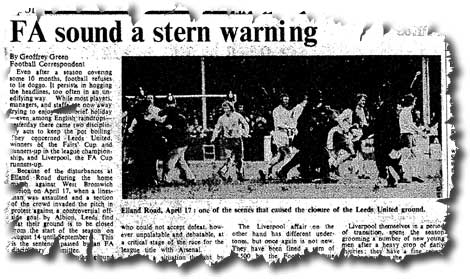 The
relationship between the football establishment and Don
Revie's Leeds United was always a fractious one. After the
club won promotion to the First Division in 1964, they were branded
'Dirty Leeds' when the Football Association singled them out as 'the club
in the Football League with the worst record last season for players cautioned,
censured, fined or suspended'.
The
relationship between the football establishment and Don
Revie's Leeds United was always a fractious one. After the
club won promotion to the First Division in 1964, they were branded
'Dirty Leeds' when the Football Association singled them out as 'the club
in the Football League with the worst record last season for players cautioned,
censured, fined or suspended'.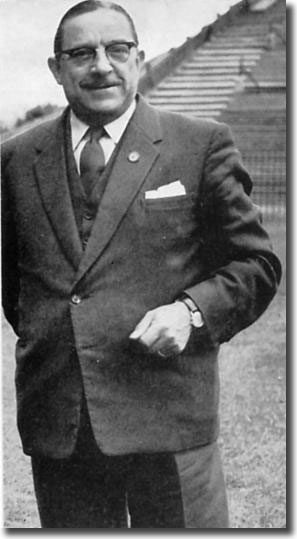 Leeds
for that period - not less than a distance of 12 miles' radius under FA
Rule 38 - to accommodate the opening four games on their fixture card
against Wolverhampton Wanderers, Tottenham Hotspur, Newcastle United and
Crystal Palace. Should the gate receipts at any of those matches fall
below the Elland Road average, the opposing club must be paid the equivalent
compensation.
Leeds
for that period - not less than a distance of 12 miles' radius under FA
Rule 38 - to accommodate the opening four games on their fixture card
against Wolverhampton Wanderers, Tottenham Hotspur, Newcastle United and
Crystal Palace. Should the gate receipts at any of those matches fall
below the Elland Road average, the opposing club must be paid the equivalent
compensation.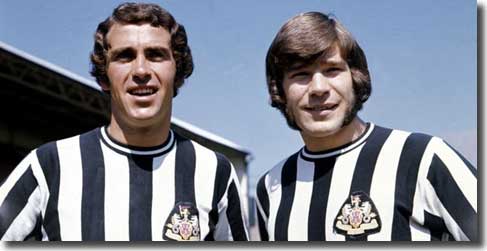 were
hopeful, though, of adding to Leeds' problems with former United
midfielder Terry Hibbitt
and £180,000 centre-forward Malcolm Macdonald eager to impress
in the colours of their new club.
were
hopeful, though, of adding to Leeds' problems with former United
midfielder Terry Hibbitt
and £180,000 centre-forward Malcolm Macdonald eager to impress
in the colours of their new club.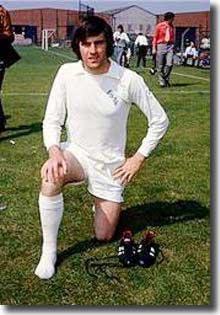 but they had a while to wait for a second goal. The Geordies,
in fact, came close to an equaliser; Macdonald was unlucky not
to score after a strong run down the left, but his powerful drive
struck Gary Sprake's right hand post.
but they had a while to wait for a second goal. The Geordies,
in fact, came close to an equaliser; Macdonald was unlucky not
to score after a strong run down the left, but his powerful drive
struck Gary Sprake's right hand post.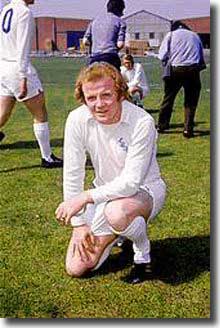 ludicrously misplaced.
ludicrously misplaced.